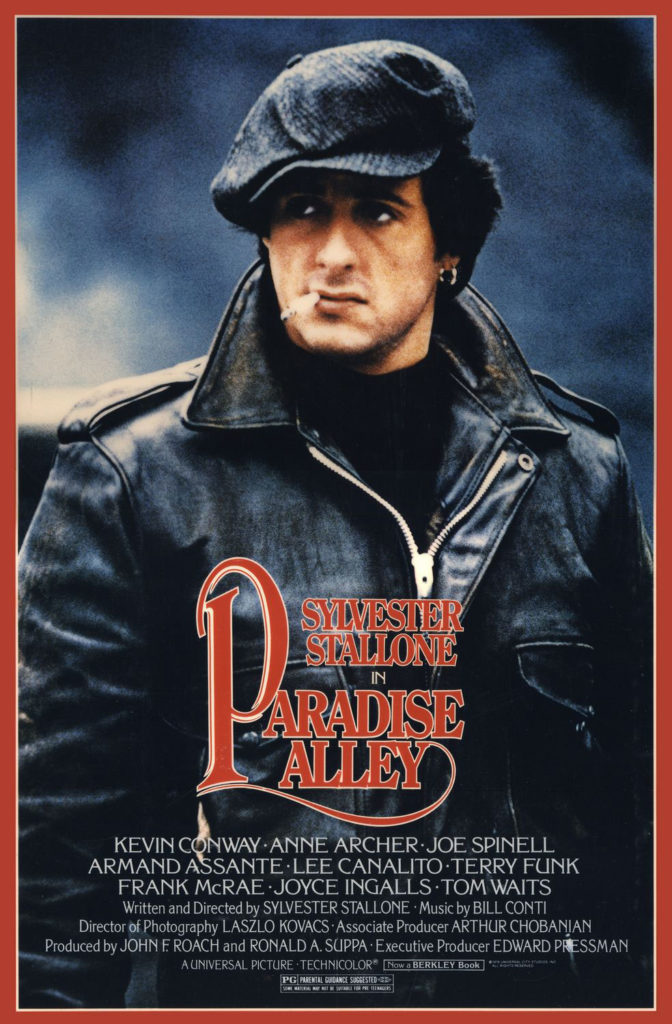Before there was Rocky, there was Paradise Alley. That might not make any sense, since Paradise Alley was made two years after Rocky. But back in the mid-1970s, when Sylvester Stallone made his pitch to Rocky producers Robert Chartoff and Irwin Winkler, this was the screenplay Sly wanted to make. They passed, but according to Sly, they said they would look at any other ideas he had. He went home that night and began to write Rocky. But there was still this screenplay out there, and after the success of Rocky, Sly was able to make this film. Not only did he write the screenplay, he also directed, starred, and, God help us, sang the opening theme song, Too Close to Paradise. All of this is very Orson Wellesian, in that it’s an overindulgent exercise in filmmaking, storytelling, and acting, but it doesn’t have the benefit of being any good.
Taking place in Hell’s Kitchen, New York City, in 1946 (the place and time in which Sly was born), Paradise Alley follows three brothers as they attempt to scrape up whatever cash they can find.
Sly plays Cosmo Carboni, who is the hustler of the family. He’s uninterested in getting full time work, preferring to make his money on the quick. Armand Assante is Lenny Carboni, a mortician who was left with a limp from service during World War II. Finally, Lee Canalito plays Victor Carboni. He’s a big man, having started hauling ice for the iceboxes of Hell’s Kitchen at age 12. His brain is about as small as his muscles are big, but he’s a sweetheart.
The film mimics a coming of age story. We’ve all seen plenty of those. Only, in this film, the main characters are already adults. Despite that, it really is the same. The brothers have strife in their daily lives involving family and lovers. Being adults, money is a  concern, as well. But Cosmo comes up with an idea that will help not just him, but all the brothers.
concern, as well. But Cosmo comes up with an idea that will help not just him, but all the brothers.
Down at a club called Paradise Alley, the owner has set up a wrestling ring. Anyone that can defeat the house champion, Big Glory (Frank McRae), will win a hundred bucks. Cosmo badgers Victor into entering the ring, and he does indeed beat Big Glory and wins the prize. Cosmo knows a good thing when he sees it, so he sets himself up as Victor’s trainer, with Lenny taking on the job of manager. Victor then begins to cut a swathe through the professional wrestling circuit of New York City. I have no idea if that was actually a thing back in the 1940s, but it doesn’t matter. This isn’t a film that embodies realism. It’s more of a Broadway show. Not the kind with all the singing, but a drama.
For one thing, the dialogue is heavy on the manic affectations and exaggerated vocabulary that is common in stage plays and movies from the golden age of Hollywood. Sly appears to have been enamored with this older style, and sought to imitate it. But imitation is all it ends up being. The lack of originality would be less of a problem had Sly come into this project with more refined skills. This was his first time in the director’s chair, and the jumbled nature of the movie indicates he was learning as he went along. All of his co-stars seemed to be patient with the process, though. When Sly has Cosmo go off on one of his period slang tangents, they wait patiently for their turn to speak.
There are times when this film is just fine. But the majority of it can never escape the looming shadow of Sly’s ego. This is a vanity project — a reward for a job well done on Rocky — and it’s obvious from the opening credits. Only a big star would lack the self-awareness necessary to make his audience sit through five minutes of Too Close to Paradise.
Sly had big things planned for this movie, but even he admitted later in life that he probably shouldn’t have been involved past writing the screenplay. Earlier, though, before time had a chance to heal the wound fully, he said in an interview with Roger Ebert, “I’ll never forgive myself for the way I allowed myself to be manipulated during the editing of that film...There were a lot of scenes in there to give atmosphere and character, and they wanted them out just to speed things along. They removed 40 scenes, altogether.” Dearest Sly, the last thing that would make this movie tolerable is more of it. This magnum opus of Sly’s is a worse film than Alien: Resurrection.
